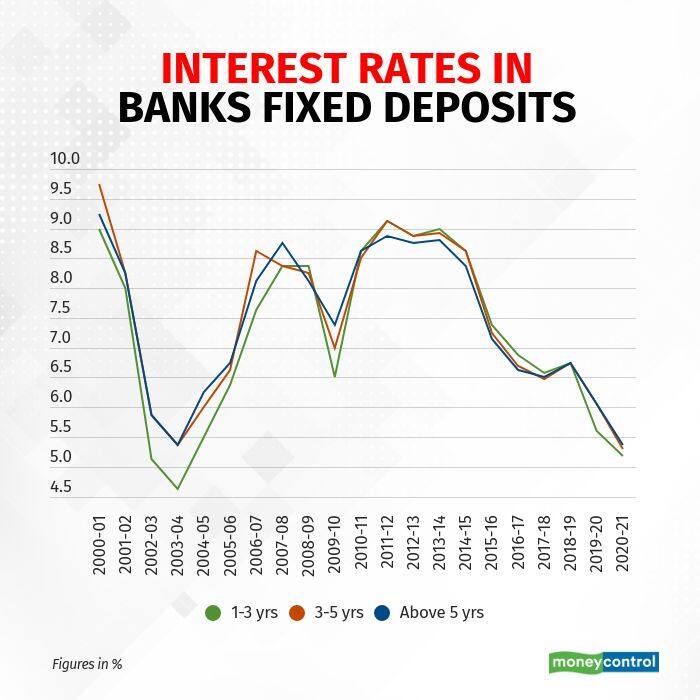



One of the first policy announcement by the Reserve Bank of India (RBI) in 2022 was a notification to further develop retail debt markets. Let’s go behind the making of this policy on retail debt markets.
What is retail debt market?
How, and where to invest has been a constant source of anxiety for retail investors. Most of them prefer investing in safe investments even if the returns are lower. Traditionally, the preferred mode for safe investments has been bank deposits, and small savings schemes. These two options have lost their glitter as interest rates have declined over the years (See Tables Below).

The interest rate on these products also takes time to change. If the RBI eases policy rates, banks quickly follow by lowering interest rates on deposits. However, when the central bank increases policy rates, banks are not in a similar hurry to increase interest rates. The small savings schemes are administered by the government, and change with a much larger lag.

Apart from falling returns, these products also lack liquidity wherein one can’t sell and convert them into cash as easily.
The RBI has offered retail investors another investment option — government debt or bond markets. Investment in the government bond market does away with the above limitations, and is highly liquid, and interest rates are market determined.
What are government bond markets?
Governments typically have higher expenditure than their revenues (taxes and non-taxes) resulting in deficits. They manage these deficits by issuing government bonds in the financial markets. The various financial intermediaries such as banks, insurance companies, mutual funds, etc. buy these bonds for both investment and prudential requirements. The central banks also infuse and absorb liquidity in markets with government bonds acting as the major collateral.
Why offer government bonds to retail investors?
The major participants in bond markets are financial firms. In other words, it is an institutional market (Table Below). Currently, retail investors invest in these bonds indirectly via mutual funds, insurance, provident funds, etc. The government, and the RBI wish to encourage retail investors to invest directly in the bond markets.

Former RBI Deputy Governor HR Khan in a 2013 speech explained the reasons for direct retail participation. First, the financial institutions act as a captive source of funding for the government. Second, retail investors will act as a stable source of funding during times of distress. Third, it will provide retail investors a stable mode of investment providing decent market-driven returns. The current yield of a five-year government bond is around 6.5-7 percent, which is higher than bank deposits and small savings schemes of a similar tenure.
What has RBI done to promote retail investment in bond markets?
The RBI has been trying to promote retail investment for a while now but has not met with much success. The reasons for low participation are low awareness and understanding of bond markets, high transaction costs, and lack of access to the market.
Over the years, the technology has developed in such a way that the RBI can now do away with all these limitations.
In February 2021, the RBI announced that it will offer a direct scheme for retail investors. The RBI followed the announcement by launching its retail direct platform. Under this platform, the investor can open an account directly with the RBI, and invest seamlessly with nearly zero transaction costs.
What is the recent policy development announced?
In January 2022, the RBI announced that it will offer market-making in retail debt scheme. The investors particularly in debt markets always face the risk that the bond they have purchased cannot be sold in the markets for lack of buyers.
The RBI has tried to work around this problem by asking Primary Dealers (PDs) to constantly make the markets. The PDs are specialised financial institutions whose job is to ensure that government bond markets remain active. The RBI had started licencing PDs in 1994 to build and do market-making in the bond markets.
The market was mainly institutional, and the PDs helped in offering liquidity to the different institutional players. The PDs played a crucial role in development of institutional bond markets, and now the same processes are being applied towards development of retail debt markets. Under the proposed policy, the PDs shall remain active throughout market hours, and respond to buy/sell requests from retail direct investors.
What next?
The problem of low awareness and education remains a challenge. The RBI is holding investor camps across India to educate and encourage investors about this platform. There is a need for constant engagement with prospective investors. The RBI could also learn from SEBI on how it went about spreading the message of equity investors.
The pandemic years has seen a surge in retail investment in equity markets, and it was possible because of the infrastructure and investor education. The RBI has developed the infrastructure, and with investor education, the retail investment could rise in debt markets too.
Discover the latest Business News, Sensex, and Nifty updates. Obtain Personal Finance insights, tax queries, and expert opinions on Moneycontrol or download the Moneycontrol App to stay updated!